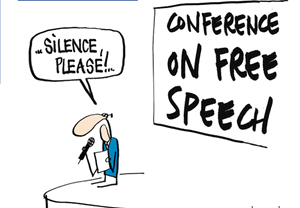
PARIS (International Federation of Journalists/Reporters Without Borders/Pacific Media Watch): UNESCO has organised a conference on journalism after the January 7 massacre at the French satirical magazine Charlie Hebdo, which killed 12 people, including seven journalists/cartoonists and three media workers.
The conference last week aimed at exchanging ideas on a number of issues concerning journalists such as the safety of journalists, the role of media as well as the responsibility of the international community to combat impunity for crime against journalists.
The UNESCO Director-General, Irina Bokova, opened the conference with a call to defend freedom of expression from violent attacks.
She cited the cited the murders of Charlie Hebdo's journalists to highlight the threat to the safety of journalists , describing them as "flag bearers of freedom of expression" and denounced as "staggering" the figures of killed journalists.
"The best tribute we can pay to journalists of Charlie Hebdo's journalists is to act and work out solutions to the crisis," she added.
Among other key speakers were the Le Monde cartoonist Plantu, a celebrated artist and member of the Cartoonists for Peace, who said that cartoons were about "shedding light , not blurring the vision or causing wanton humiliation".
France's Secretary of State for Development and Francophonie, Annick Girardin, stressed that France had a secular system, which allowed everyone to chose what faith and whether to believe, without the state's interference.
Journalists' safety
The morning session was dedicated to the safety of journalists, bringing together media professionals and press freedom campaigners.
The IFJ , represented by its first vice-president Younes M'Jahed, Dominique Pradilie from the Syndicat national des journalistes (France) and Ernest Sagaga Head of Human Rights and Safety, took part in the debate.
The IFJ delegation reminded the conference that , while the attack on Charlie Hebdo was the worst ever recorded in Europe, such violence had claimed lives of journalists inmany parts of the world for years and that the federation was spearheading the campaign to end impunity for violence in journalism.
Reacting to the remark that "'journalists are being not only killed, but increasingly murdered", Pradilie made a call to the conference for global action to ensure accountability at some legal institution in the face of continued failure by governments to investigate attacks on journalists.
There were also proposals to capitalise on the Unity March which brought recently together world leaders to increase pressure on governments which don't respect the rights of journalists, including by lobbying international donors to adopt economic sanctions.
In the afternoon, the conference discussed intercultural dialogue and fragmented societies in a debate which heard from leaders of Muslim, Christian and Jewish religions, as well as French politicians.
Reporters Without Borders has published a collection of Cartoons for Press Freedom in collaboration with the Cartoonists for Peace group.
This work is licensed under a Creative Commons Attribution-NonCommercial 3.0 New Zealand Licence.




